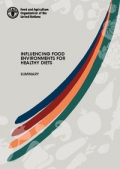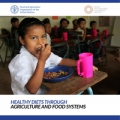
Capacity development
FAO is actively supporting regional and country capacities to shape food systems that enable healthy diets. Developing appropriate food systems policies and actions entails improving governments' and non-State actors' capacities for carrying out the necessary actions. To achieve this goal, FAO has developed a Capacity Development Roadmap in support of the revised Vision and Strategy for FAO's Work in Nutrition (FAO's Nutrition Strategy). The Roadmap will steer the capacity development activities by addressing current gaps and leveraging opportunities. To know more about the Capacity Development Roadmap and its implementation click here.
Main resources by thematic area
FAO has developed a series of technical papers, policy briefs, manuals, e-learning courses, webinars and videos to assist partners in the design and implementation of appropriate, informed and coherent food systems policies and actions.
Click on the thematic areas to know more about our capacity development resources and publications.
Resources
22 November 2016

More and more people are becoming overweight and obese, with increasing diet-related non-communicable diseases (NCDs). Behind the global shifts in malnutrition and NCDs are unhealthy diets and a sedentary lifestyle. Our food systems and the food environments are not delivering...
01 November 2016

This simple guide is for those responsible for the monitoring and evaluation (M&E) of investment projects in food and agriculture (including and in addition to value chains, social development, and rural development) that need to demonstrate that they lead to...
15 September 2016

Prevention is always better than cure; lifestyle and food play a critical role in disease prevention and management. The earlier a person starts to eat a healthy and balanced diet, the more he or she will stay healthy and be...

Schools can develop multiple-win situations and positive outcomes in learning performance, food security, nutrition, rural development, local economy and lifestyle practices and habits. This short document provides comprehensive models of action currently being promoted and key factors of success.
30 June 2016

Despite its nutritional, economic, social and cultural importance, street food in Africa is undermined by food safety issues, poor nutritional variety, widespread informality of vendors , and policy gaps. Major findings provided by literature throughout the last two and a...






